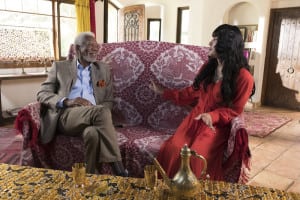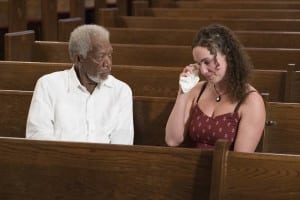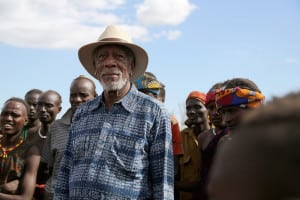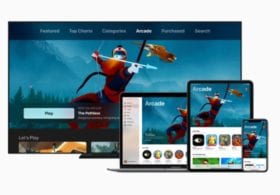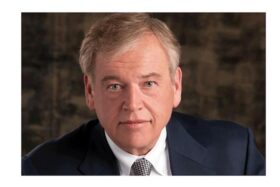By Cathy Applefeld Olson
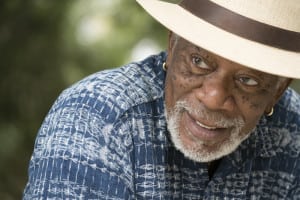 Morgan Freeman has mastered many roles. And while he’s still delving into fictional characters, of late he’s been portraying a particularly inquisitive one—himself. Freeman narrated last year’s Nat Geo series The Story of God, in which he talks with theologians, archaeologists and others about various belief systems around the globe. He returns Wednesday, October 11 with sequel of sorts The Story of Us with Morgan Freeman, which finds him in conversation with an array of individuals who by sharing their stories peel back the superficial differences to reveal commonalities that bond us as humans.
Morgan Freeman has mastered many roles. And while he’s still delving into fictional characters, of late he’s been portraying a particularly inquisitive one—himself. Freeman narrated last year’s Nat Geo series The Story of God, in which he talks with theologians, archaeologists and others about various belief systems around the globe. He returns Wednesday, October 11 with sequel of sorts The Story of Us with Morgan Freeman, which finds him in conversation with an array of individuals who by sharing their stories peel back the superficial differences to reveal commonalities that bond us as humans.
Freeman and fellow exec producers Lori McCreary and James Younger sat down with Cynopsis to talk about the new project, and its particular resonance in our current political climate.
Cynopsis: Do you see The Story of Us as a sequel to The Story of God?
Morgan Freeman: Probably before we finished The Story of God we were talking about a follow-up. I personally thought we were going to do “The Story of Man,” and in my head thought we were going to go from sludge to here, something more anthropological.
Lori McCreary: What people responded to in The Story of God were the personal connections Morgan is making with the individuals. So we thought, maybe that’s a good way to talk about society and love and peace, from the perspective of Morgan connecting with the people.
James Younger: The simplest way to talk about the connection between the two stories is The Story of God was [released at] a time of apparent religious tension in the world, so we thought, Let’s look at how all of our faiths are connected, the common ground. And now, I think this is apparently a time of great cultural, tribal tension—tribalism in the broadest sense of the word. Now, why don’t we look at what we share in common in our human spirit?
Cynopsis: While filming, did you feel like Morgan Freeman the person, Morgan Freeman the actor, or a little bit of both?
MF: You can’t separate the one from the other. But in a conversation with someone, particularly someone who is going to be talking to you about very deep things in their background, like the young man from North Korea or the woman from Afghanistan or the young man from Romania, who as children had very traumatic lives, this is… very listenable. And one of the things I am really good at is listening.
Cynopsis: Do you think you listen more at this stage of life than you did when you were younger?
MF: Well I don’t know how old I was when I either heard or read this little ditty: “A wise old owl sat on an oak. The more he heard, the less he spoke. The less he spoke, the more he heard. Why can’t we all be like that wise old bird.”
Cynopsis: Some Story of Us segments are harder to swallow than others. Do you feel more hopeful having these conversations?
MF: I don’t think my personal sense of our continued existence was altered by the conversations I had with people. You talk to eight different people from eight different parts of the world, and you get eight different perspectives on what is ahead of us. And what is ahead of us is unknown. We don’t know what we are going to decide to do next, and I shouldn’t bring this up, but one of the prime examples of it is our current President. Many people in the country keep saying “What?” “How?” But we did.
LM: It feels like the worst time in my life, but I was talking with my dad, and he said it doesn’t feel as bad as when he was growing up. It’s cyclical in some ways, and hopefully we learn a little more.
JY: Having done these series and delved into all these divisions and conflicts, and people coming through all these situations, you can’t help but feel hopeful. There’s this great resilience of the human spirit. We have the ability to bridge divisions, we saw that again and again. And we want to get the message out there to give people hope. It’s necessary.
Cynopsis: Do you think the series will carry a different weight given our current political divisions, that it will resonate differently with viewers?
MF: It could very well carry a very different weight than it would otherwise. Because we do find ourselves in a situation, this country, where we just can’t predict.
LM: We had already filmed the episode with [musician] Daryl Davis, a gentleman who decided the way he could make a difference was to go around and befriend people from the KKK and try to make a connection. He was interviewed before everything happened in Virginia, and after that we started looking at what was happening and how we could make connections with the show. That was for me a really powerful segment where it’s not just in the past, where we would see people with the hooded robes, but we’ve just seen the current-day example of what that looks like, and connecting them in the show is really important to us.
JY: You tend to think we’re more divided now than ever, but we’re not. We were just as divided before, we’re just now confronting it. It was always there. This is the opportunity to start conversations.
Cynopsis: [Freeman recently filmed a PSA for the Committee to Investigate Russia, a group started by Rob Reiner, in which references Russia’s hacking of the US Presidential election and asks Donald Trump to directly confront Russian president Vladimir Putin]. You recently made a personal political statement…
MF: I didn’t make a personal political statement. I read a script.
Cynopsis: I’m assuming you felt comfortable with it, or you wouldn’t have read it? Was it an easy yes for you to film the PSA?
MF: Yes, I felt comfortable with it, and I was doing a friend a favor. “Would you do this?” It was, well… a questionable yes, but a yes.
Cynopsis: Are you surprised by the reaction? You’ve been labeled public enemy No. 1 in Russia.
MF: Yeah [chuckles], I’m surprised at how seriously it was taken. But, alright, fine. It’s certainly a topic, especially when you speak and use the term “war” as I did.
One of the things about the show that struck me is not just it’s looking back through history, but it’s spreading out to take in so many other cultures. Were there particular conversations that opened your mind to a new way of thinking?
MF: I want to brag that I have an open mind, that I’m nonjudgmental when it comes to cultures, peoples. I grew up in the
south as a minority, and so there was dealing with that. And then the rest of my life, the travels and the luck. I don’t think anything that we experienced opened my mind. I feel more like a vessel, particularly when we were doing The Story of God. We learned about religions, belief systems that may be diametrically opposed, but at the same time meet in the middle somewhere. I don’t think I have been changed. I did learn one thing, and that is what my belief system is called–Zoroastrianism. Good thoughts, good words, good deeds. Sums it up.
Cynopsis: What do you hope viewers take away from The Story of Us?
JY: We’ve got great stories of people being brought together by information and technology. Look at Megan Phelps-Roper, who left the Westboro Baptist Church because she started a social media conversation with a Jewish man in Jerusalem. They managed to start talking, and that’s how she came out of her life in a hate group. There are ways for all sorts of people to change the status quo, change lives.

